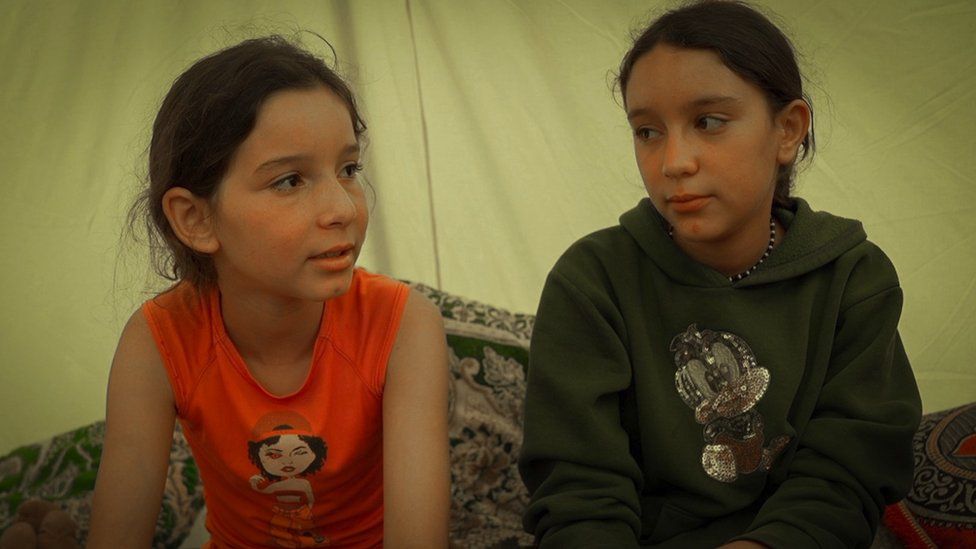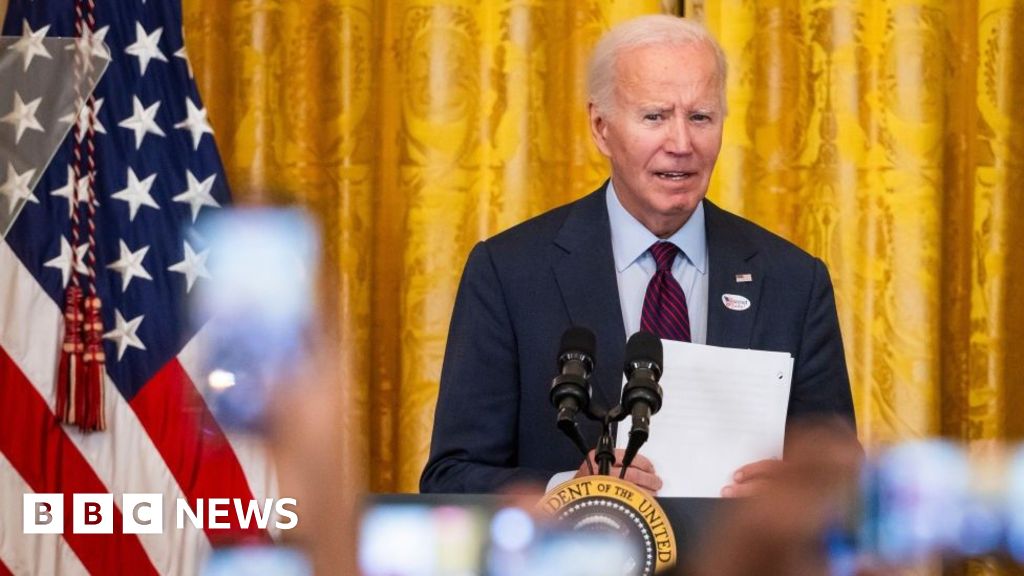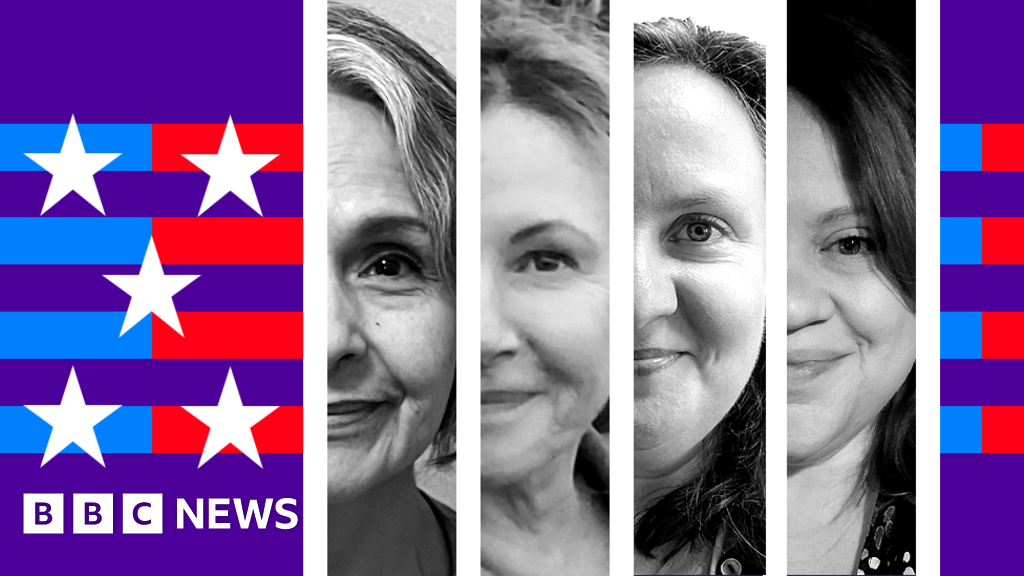ARTICLE AD BOX

Malak (R) and Doaa (L) have been traumatised by the earthquake
By Sally Nabil
BBC Arabic, High Atlas Mountains, Morocco
Clinging to her dream of becoming a dentist, 12-year-old Malak is desperate for her life to return to normal after the devastating earthquake that struck Morocco two weeks ago.
"I want to get out of here, I am suffocating," she tells me, referring to the makeshift tent she is now forced to live in, like many other children in the High Atlas Mountains.
Malak is the oldest of four siblings. None of them are going to school after large parts of their hometown - Amizmiz - were reduced to rubble in the 6.8-magnitude earthquake that struck on 8 September.
It was the strongest earthquake to hit Morocco in more than 60 years, killing more than 2,900 people and injuring more than 5,000 others.
Remote villages were hardest hit, with more than 50,000 homes destroyed or partially destroyed. To get aid in has been difficult, as many roads have been blocked due to landslides that followed the earthquake.
As we walk around Amizmiz, 50km (31 miles) south-west of the historic city of Marrakesh, we can see vast areas dotted with plastic tents that hardly provide any proper shelter to distressed families. Everybody wonders what they will do when the chilly winter arrives soon.
"We want food, money and, above all, we want a house," says Malak.
She is frustrated that the damage caused by the earthquake means she can't return to school.
"It's my future at risk here," she tells me, adding that she wants to become a dentist.
"My mum has done a lot for me and my siblings.
"She's been working hard to raise us, I wish to grow up and work, to pay her back for all her efforts," she explains, with eyes full of sadness.
Morocco's government has provided families with tents
I spend some time in the yellow plastic tent, provided by the Moroccan government, speaking to other members of Malak's family.
It is obvious that her younger sister Doaa, who hopes to one day become an architect, is deeply traumatised.
"I dream about the earthquake every night, it's so scary," she says, her face pale.
"I sometimes wake up, from my dreams, to find the ground shaking."
Many children I speak to recount similar experiences to Malak and Doaa.
The UN children's agency, Unicef, says that nearly 100,000 children have been affected by the earthquake.
It warns that aftershocks are likely to continue in the days and weeks ahead, putting children and families at further risk of physical injury and mental trauma.
On another side of the camp, Jamila is cleaning dishes, while her youngest daughter Ikhlas is busy making tea.
"It's hard," Jamila tells me, struggling to hold her tears back.
She explains that most of the aid supplies arriving at the camp have been handed out by volunteers.
"There are no toilets here. I am afraid we will fall sick at some point, all of us are exhausted," Jamila says.
Moving request for lipstick
Many of the families in the camp are poor and were already struggling to make ends meet. The earthquake has only added to their misery.
As Jamila speaks to me, 10-year-old Ikhlas listens, attentively. She offers to take me to her nearby school, which was wrecked.
Ikhlas is desperate to see her school friends and teachers
On the way, Ikhlas tells me about the night the earthquake hit.
"I ran to my father to hide and kept reciting verses from the Quran. It was just like doomsday," she says.
She was terrified by the recent aftershocks.
"I just run out of the tent when it happens," she says.
Nothing remains of the school but cracked walls and heavily damaged classrooms. The scale of the destruction is tragic.
Like Malak, Ikhlas misses her school.
"I want to see my teachers and friends."
As we are about to leave the camp, a woman asks me quietly: "Do you have any lipstick, or perfume? I want to smell good."
Her words were moving. The request might sound a bit surprising, but toiletries and cosmetics are rarely included in any aid packages given to the affected families in Morocco.
Women might even be embarrassed to ask for it. But people need more than just food or blankets. They need to feel human.
Drawing dead animals
The Moroccan authorities say they are doing their best to alleviate the suffering.
King Mohammed VI has said that the country will spend 120bn dirhams ($11.6bn; £9.4bn) to rebuild areas destroyed by the earthquake.
Financial aid will also be handed out to the victims.
But no exact timeframe has been given for these plans, which will require massive resources.
Morocco has been very selective so far in accepting foreign aid, only agreeing to receive help from four countries - Qatar, Spain, the United Arab Emirates and the UK.
Volunteer nurse Mohamed Amin is helping children to deal with the trauma
Local volunteers warn me that support will need to focus on more than just buildings and money.
The mental health of victims, especially children, is at risk.
In a simple tent, made from plastic sheeting and with a few tables and chairs for children to sit in, one group of volunteers is trying to help young people deal with their trauma through drawing and writing.
"They draw demolished houses, and dead animals," volunteer nurse Mohamed Amin tells me.
Along with other volunteers, he travelled more than 300km (186 miles) from the Moroccan capital, Rabat, to help families in need.
"When we first arrived, children wouldn't talk to us, they were too traumatised," he says.
It took several days for the children to open up and start dealing with what they had experienced.
It will take far longer for their trauma to heal.

 1 year ago
19
1 year ago
19








 English (US)
English (US)